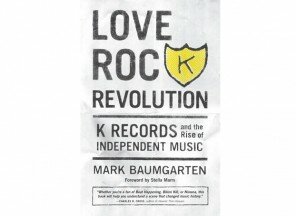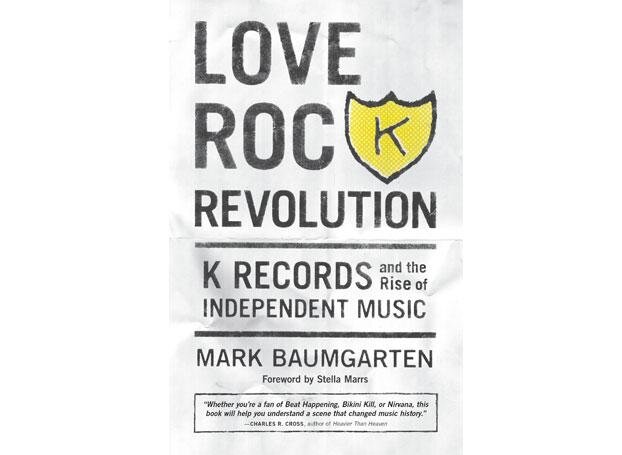 Mark Baumgarten reads from his book, Love Rock Revolution: K Records and the Rise of Independent Music, at Elliott Bay Book Company on Wednesday, July 18, at 7 p.m. He’ll wrap up his book tour in Olympia, at the Olympia Timberland Library, on July 27.
Mark Baumgarten reads from his book, Love Rock Revolution: K Records and the Rise of Independent Music, at Elliott Bay Book Company on Wednesday, July 18, at 7 p.m. He’ll wrap up his book tour in Olympia, at the Olympia Timberland Library, on July 27.
When Mark Baumgarten edited now-defunct Sound Magazine and indulged my interest in the city’s grunge-era glory, he didn’t seem as especially interested in what had come before. He had the pulse of Northwest folk artists and fresh singer-songwriter types, and knew the up-and-comers in just about every genre. With Love Rock Revolution: K Records and the Rise of Independent Music, he proves he is indeed tuned in to local music history, immersing us in a richly-detailed and accessible portrait of Olympia’s ’80s and ’90s indie scene and its champion, Calvin Johnson.
Johnson, despite the book’s sweeping subtitle, is the real focal point; it makes sense, as K Records was (and still is) his baby. Around 100 pages chronicle his quirky artistic tastes as a teen, his tendency toward various punk sub-genre aesthetics, his tenure as a thrilled Evergreen State College KAOS DJ, and his blossoming relationships with other punk/pop musicians.
Through Baumgarten’s direct, relatable prose, we learn how Johnson’s ear for rough, odd rock and pop led him to start making similar music. How he valued musical spontaneity and simplicity—in himself and others—being far more concerned with the distribution of tunes than technical know-how, note-perfect execution, and production value. He wanted to share every “jangly,” “wobbly,” “playful,” “juvenile” song with anyone who was interested.
Oddly, though, details on Johnson’s character traits and business acumen (and even appearance) are few and far between. While we learn much about his travels and endeavors—and that he doesn’t play guitar well, sings with a deep voice, and is given to fits of dancing—the man himself remains mostly an enigma. (Maybe that’s Baumgarten’s intent; the book lacks photographs, a fact that feels a little like winking oversight, a little like punk itself.) As a result, it’s a bit of a challenge to connect with Johnson’s portrayal and really understand and appreciate his drive and accomplishments.
And he sure has accomplished a lot, as Baumgarten recounts. Where there was no underage music scene, he created one, almost single-handedly. His quick-and-dirty early recordings and cassette distribution methods helped build a community of punk, pop, and unconventional artists and an enthusiastic audience (however small) to evangelize the music.
Johnson’s K Records released work from artists and bands like Mecca Normal, the Go Team, Built to Spill, Modest Mouse, and, of course, Johnson’s own Beat Happening—and inspired numerous others. Like Kurt Cobain, who, it’s told, would have rather been aligned with K than Sub Pop Records. (Would things have gone differently for the band if that had been the case? Johnson recorded numerous albums only to shelve them for a year or more. And he purportedly rejected Nirvana’s early calling-card tape because it came to him through Cobain’s girlfriend.)
It’s this inspiration aspect that truly fascinates: Love Rock explains how K Records and some of its acts (along with contemporary labels Sub Pop and Kill Rock Stars) laid the foundation for the Northwest rock explosion of the early ’90s. In pursuing his desire to simply get music out there, Johnson rubbed shoulders with similarly driven—and admittedly more technically talented—people and bands like Steve Fisk, Mark Lanegan, Mudhoney, and Nirvana. Key crafters of what would be labeled the Seattle Sound (or benefit from that label).
Those artists appreciated Johnson’s desire to make and share music as easily as possible, but (most of) their fates would be far different than the label chief’s. As the world tuned in to Seattle’s “grunge” bands—acts that fused elements of metal, punk, and classic rock into agreeably melodic music—the eclectic K stable continued to fly under the mainstream radar. Even when some of its bands received critical praise from alternative outlets, major success was elusive.
But that doesn’t seem to ever have been in Johnson’s interests. Like Al Larsen, a singer in Eugene, Oregon’s Snakepit when this scene was coalescing—the man who coined the “love rock” label (not Mother Love Bone’s Andrew Wood, whom I’d solely associated the term)—the K chief was in it for a hopeful “transformation of society,” even in the simplest of ways. He’s always just wanted people to play and listen.
Baumgarten’s Love Rock Revolution is proof that people are still doing that, three decades later. Even if the book doesn’t entirely illuminate Calvin Johnson’s character, it presumably does what he’d hope for: simply share how a scrappy, punk-ethos community rose up around his influential label. Like the K Records catalog, the book won’t amaze the masses, but it’ll thrill a deserving niche.

